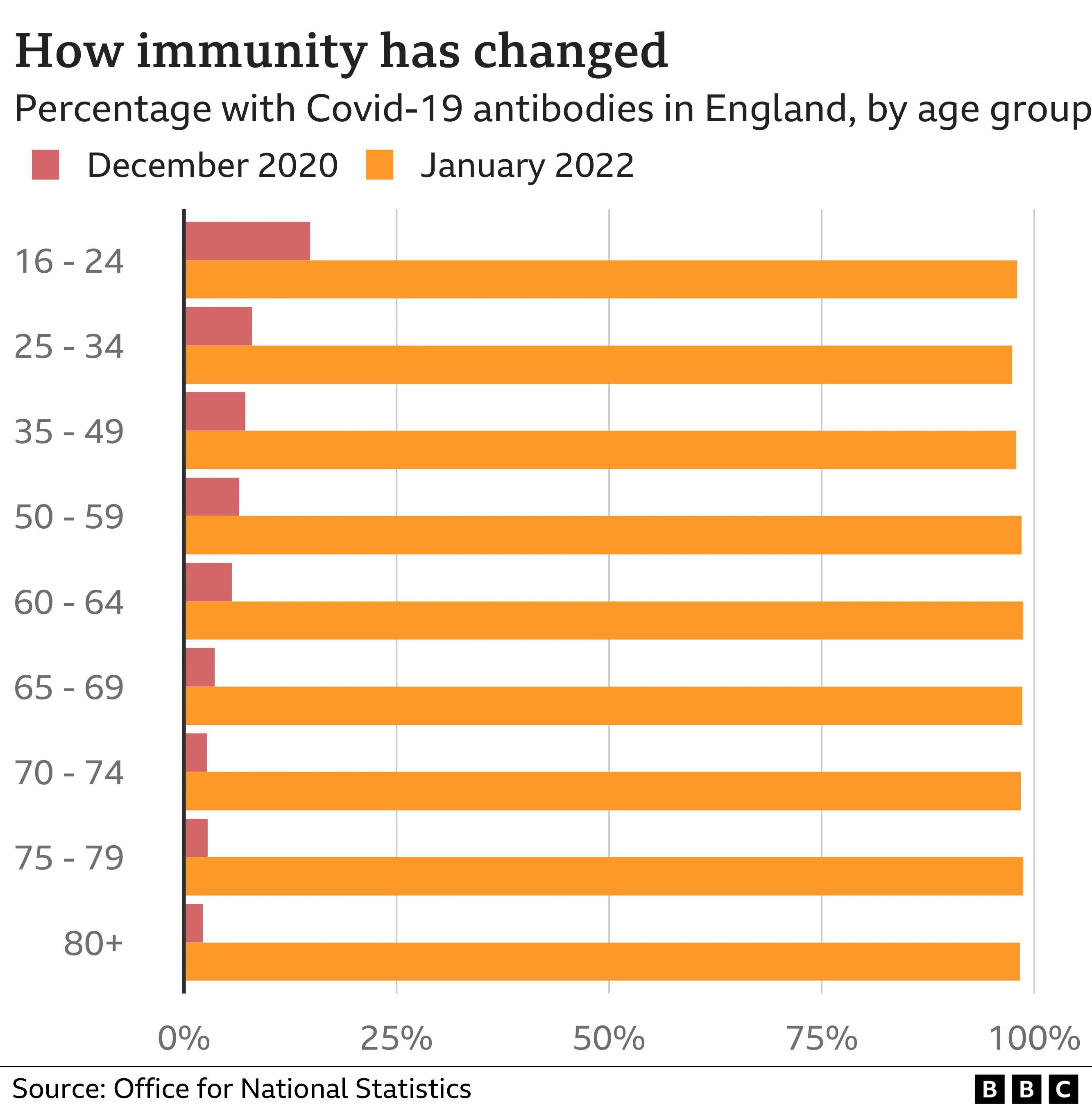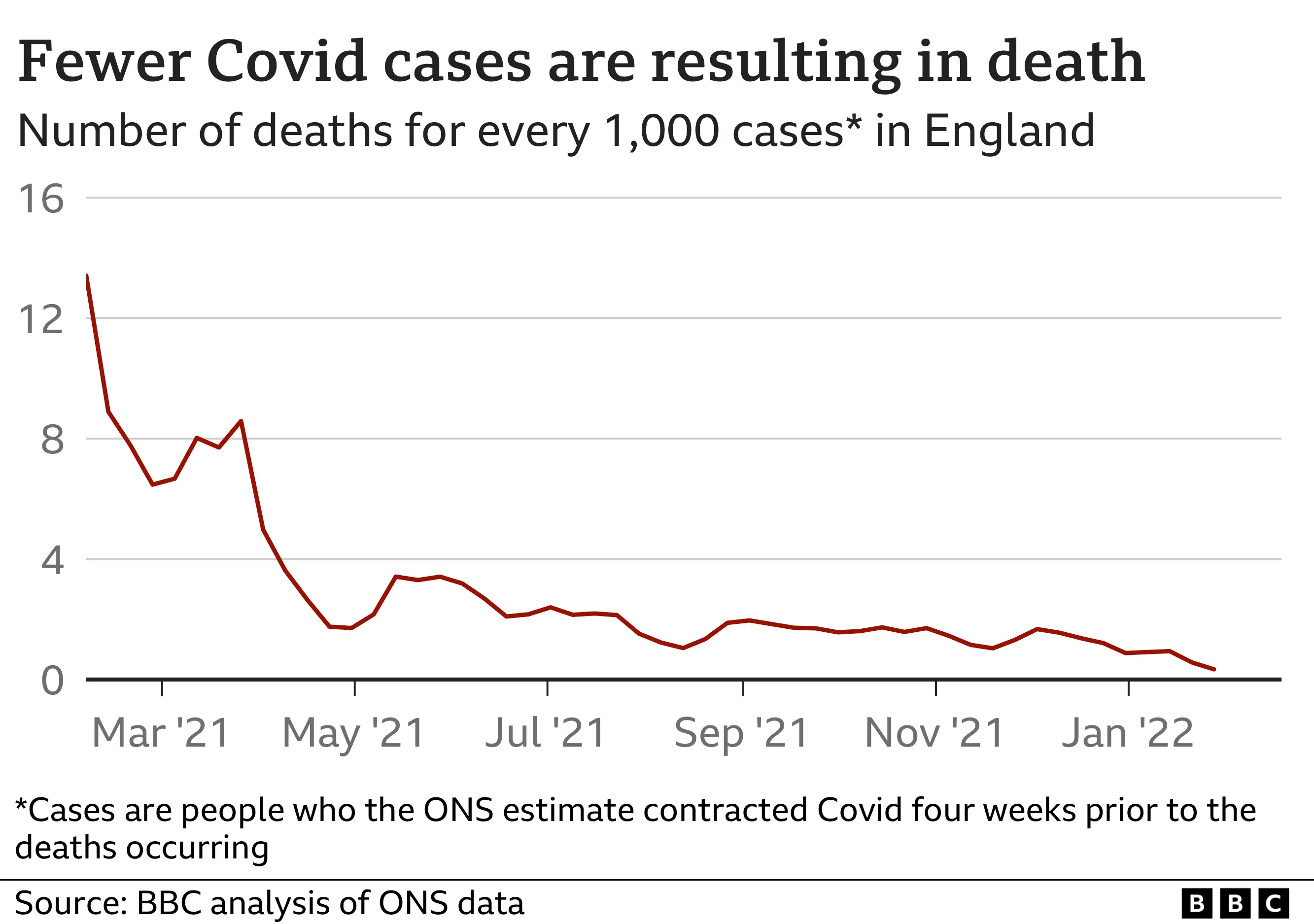Covid: Is England ready for its last remaining rule to be ditched?

 Getty Images
Getty ImagesEngland looks set to scrap its last remaining Covid rule - the need for infected people to isolate - while other parts of the UK are in the process of relaxing many of their remaining restrictions.
Testing capacity is also likely to be scaled back, with an announcement expected from the UK government later.
It is all part of what is dubbed as "living with Covid". But are we really ready for this? Can Covid be treated like any other illness?
Our immune systems are trained to fight virus now
When Covid first hit, our immune systems did not know how to fight the virus. We were what is called an immune naïve population.
Deaths soared as a result, with the old and those with health conditions by far the most vulnerable.
About 80% of the Covid deaths that have been seen in the UK happened in the first 12 months of the pandemic.
Since then the immunity - largely built up by vaccination, but also topped up by infection - has made all the difference.
The simplest way of measuring that is to look at how many people have Covid antibodies.
The presence of these does not tell you how well protected people are, but they are a sign that their bodies at least recognise the virus and have some knowledge about how to fight it.
Before the vaccine programme was rolled out, in the middle of the deadly winter wave of 2020, antibody levels were very low, particularly in the older age groups.
The situation now is completely different. Antibodies are present in at least 97% of people across all age groups over the age of 16.


What's more, in the older age groups virtually all the immunity comes with the additional benefit of having had three vaccinations; among the over-60s more than 95% have been boosted.
Those three jabs are providing excellent protection against serious illness and death.
For example, an average 70-year-old who has received a booster now has a similar risk to that of someone 30 years their junior prior to vaccination rollout.
As a consequence, the death rate from Covid has dropped dramatically.


Our immune systems are now highly trained to fight Covid.
And we have been further assisted by the emergence of Omicron, the variant which caused the winter wave, which is intrinsically milder as well.
Is Covid now similar to flu?
Comparisons with flu are difficult - partly because we simply do not have equivalent data on the flu virus because it is not monitored like Covid.
But certainly the death rates we are now seeing from Covid are close to the estimates for flu.
That much can be inferred from the number of Covid deaths in recent months. This winter Covid deaths did not rise above 300 a day on average - lower than the estimated peak of flu deaths seen during the last severe flu season in 2017-18.
It has meant, despite the huge wave of infection driven by the Omicron variant, the overall number of deaths seen recently has not been above what you would normally expect in winter.


There are, of course, caveats. The amount of mixing and socialising people do has been comparatively low - with the most vulnerable, particularly those with weakened immune systems, likely to have continued taking extra precautions.
This group does not get as much protection from the vaccines - although many so still receive a significant amount.
But with new treatments being developed all the time, there is every reason the risks will keep falling even as society returns to normal. Just this month, the most vulnerable patients began receiving an antiviral called Paxlovid, which, in trials, cut Covid hospitalisation by 88%.
The clinically vulnerable will, though, remain at higher risk than others, although the same could be said during every winter when flu and other respiratory viruses circulate.
And what about long Covid? This virus is not the only one to cause long-term symptoms - flu does, albeit not as frequently. However, research is now showing that the long Covid risk is reduced once a person is vaccinated.
Prof Sir David Spiegelhalter, a statistician and expert in understanding risk at University of Cambridge, believes it is now time to start seeing the risks as similar to those we face from other viruses and hazards we encounter in our lives.
But he says, among some, Covid has assumed what is called a "dread risk" - the mental and emotional toll of the pandemic means people overestimate the actual risks.
"Those feelings of dread make it challenging to accept a risk as something 'normal', to weigh it up in the way we all have to weigh the inevitable risks of everyday life."
Why it's time to rethink testing
The taming of Covid means ministers are now looking to dismantle the infrastructure used to monitor and test for the virus, arguing it needs to be judged alongside other priorities for spending. It is, the argument goes, no longer an exceptional threat that requires an exceptional response.
During the pandemic £37bn has been set aside for the test-and-trace system, which covers everything from the PCR testing centres and labs, to the free rapid tests which people have taken in their own homes.
Not all the money has been spent, but it is still a huge sum - more, for example, than has been budgeted for GP care.
 Getty Images
Getty ImagesPublic health directors, who have been heavily involved in the system, accept some scaling back is warranted, but it must be done carefully.
Liverpool director of public health Matthew Ashton says there will need to be some testing to keep a check on how much virus is circulating and deal with outbreaks in workplaces, and settings such as care homes and hospital.
He says it will also be important to give people some access to free rapid tests - something reports have suggested may be stopped altogether but is considered important for the public when mixing with more vulnerable friends and family.
Mr Ashton says the ability to once again ramp up the system if required will be needed. But none of that, he adds, "requires mass testing the community".
It is also likely there will still be guidance stressing the need to stay at home if you are ill. While that does not carry the same weight as a legal mandate, it is worth bearing in mind an estimated half of people who catch Covid never come forward for testing and so were not being formally asked to isolate anyway.
But some have warned there is a risk that taking this last step could prompt a big behaviour change - the caution that has characterised the public's response could go. It's why the communication of the steps being taken will be crucial.
Covid is not over. It is still circulating at high levels and waning immunity to infection means we can expect to catch it again and again. Although typically those repeat infections will be milder.
And there is, of course, always the potential for new variants - government modellers have been clear we should expect further waves.
Nonetheless, the days of exceptional levels of serious illness and death are, the science suggests, almost certainly past.
Follow Nick on Twitter.
Read more from Nick.
